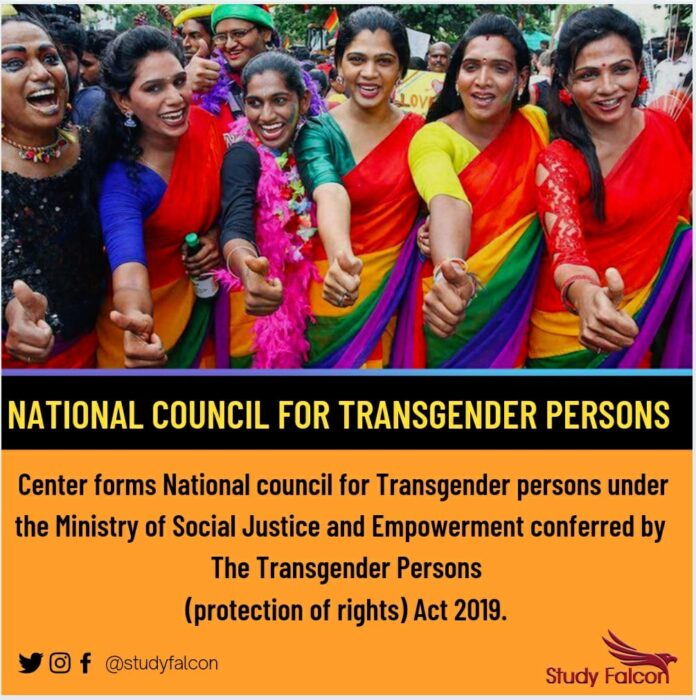The Centre , Ministry of Social Justice and Empowerment has constituted the National Council for Transgender Persons to formulate policies, programmes, legislation and projects regarding members of the community for achieving equality and full participation by them. The council was established by the Centre in exercise of the powers conferred by the Transgender Persons (Protection of Rights) Act 2019.
Functions excised by the council
Advising the Central government on the formulation of policies, programmes, legislation and projects with respect to transgender persons. Monitoring and evaluating the impact of policies and programmes designed for achieving equality and full participation of transgender persons. Reviewing and coordinating the activities of all the departments. Redressing grievances of transgender persons.Performing such other functions as prescribed by the Centre.

Composition of the council
The council have representatives from community members, five states and 10 central departments. Its chairperson will be the Union Minister of the Ministry of Social Justice and Empowerment while the vice-chairperson will be the junior minister in the ministry. The other members will be from the Ministry of Health and Family Welfare, Ministry Home Affairs, Ministry of Housing and Urban Affairs, Minority Affairs ministry and Rural Development ministry among others. The representatives of the state governments and union territories by rotation, one each from the north, south, east, west and northeast regions have also been announced. Also, five representatives of the transgender community, one each from the north, south, east, west and northeast regions have also been announced.

Features of Transgender Persons Act, 2019
Seeks to establish National Council for Transgender persons.The Act defines a transgender person as one whose gender does not match the gender assigned at birth. It includes transmen and trans-women, persons with intersex variations, gender-queers, and persons with socio-cultural identities, such as kinnar and hijra. The Act states that a transgender person shall have the right to self-perceived gender identity. A certificate of identity can be obtained at the District Magistrate’s office and a revised certificate is to be obtained if sex is changed. The Act has a provision that provides transgender the right of residence with parents and immediate family members. The Act prohibits discrimination against a transgender person in various sectors such as education, employment, and healthcare etc. It states that the offences against transgender persons will attract imprisonment between six months and two years, in addition to a fine.

Conclusion
The establishment of National Council for Transgender Persons which seeks to increase awareness and inculcate sense of respect and acceptance for transgender community, is a welcome step. However, its upto the effective functioning of the council whether it will able to identify the issues faced by the transgender community and accordingly advice the government. Apart from policies and regulations, there is also a need for an inclusive approach, sensitizing legal and law enforcement systems in particular towards the issues of transgender community.










